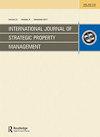Service Diversification Strategies and Performance of Hospitality Industry in Rwanda: A Case of Centre National d’Education Transformatrice (CENETRA)
IF 2
4区 管理学
Q3 MANAGEMENT
International Journal of Strategic Property Management
Pub Date : 2022-10-29
DOI:10.53819/81018102t6039
引用次数: 0
Abstract
In current competitive, changing business world, with the aim to increase performance firms are constantly struggling to satisfy various needs of customers and maintain a competitive advantage in the market. As a strategic alternative, diversification is used by business organisations targeting to outpace new entrant and or existing firms. The main objective of this study is to examine the influence of service diversification strategy on organisational performance of hospitality industry in Rwanda. From the main objective the researcher derived three concise targets pointing to three types of diversification strategy. The targets were to determine consecutively the influence of concentric, horizontal and conglomerate strategies on the performance of CENETRA Hotel. Findings of this research are useful to hotels and other accommodation establishments owners who intend to gain a competitive advantage, sustain and grow their businesses diversifying their services. The research results will inform the Private Sector Federation (PSF) and Rwanda Development Board (RDB) on priorities to be considered in developing hospitality business sector. Moreover it will broaden research field and the domain of diversification strategies where influence of a variety of services can have on firm’s performance. Descriptive design also known as statistical design and analytical design was used by the researcher. This study targeted 54 staff members, 4 management team members CENETRA Hotel and 47 permanent customers at CENETRA. It adopted probability stratified, random and purposive sampling technics. Questionnaires and interviews were used to collect primary information and documentary review was applied to collect secondary data and SPSS version 21 was used for data analysis. Descriptive statistics with the mean, standard deviation, and Pearson’s correlation coefficient were utilised and inferential statistics with regression analysis were applied for data interpretation. Findings revealed that concentric diversification strategy is very highly correlated with organisational performance with Pearson’s correlation value= 0.935, p value=0.001<0.05. Moreover results uncovered that horizontal diversification strategy is significantly positively correlated organisational performance. A mean of 38% of total respondents strongly agreed, 57% agreed, with presented statements with a correlation coefficient value of 0.929 p=0.004<0.05. Conglomerate diversification strategy is positively correlated to organisational performance as quantified by Pearson’s correlation coefficient of 0.725 p=0.002<0.05. These statistical figures were supported by four managers answers of interview who affirmed that service diversification strategies has a positive influence on performance of hospitality industries in Rwanda. Thus the research established that service diversification strategy highly influence the performance of hospitality industries in Rwanda. It is recommended to hospitality organisations to diversify their services implementing concentric, horizontal and conglomerate diversification strategies, to PSF and RDB to consider service diversification strategies in policy making in order to strengthen more hospitality industry in Rwanda. Key words: Service Diversification Strategy, Hospitality, Organizational Performance卢旺达服务多样化战略与酒店业绩效:以国家教育转型中心为例
在当今竞争激烈、不断变化的商业世界中,为了提高绩效,公司不断努力满足客户的各种需求,并在市场上保持竞争优势。作为一种战略选择,多元化被商业组织用于超越新进入者和/或现有公司。本研究的主要目的是研究服务多样化战略对卢旺达酒店业组织绩效的影响。从主要目标,研究者得出了三个简洁的目标指向三种类型的多元化战略。目标是依次确定同心战略、横向战略和集团化战略对CENETRA酒店绩效的影响。这项研究的结果对酒店和其他住宿机构所有者来说是有用的,他们打算获得竞争优势,维持和发展他们的业务,使他们的服务多样化。研究结果将向私营部门联合会和卢旺达发展委员会通报在发展接待业务部门时应考虑的优先事项。此外,它将拓宽研究领域和多元化战略的领域,各种服务的影响可以对公司的业绩。描述性设计也被称为统计设计和分析设计被研究者使用。本研究的对象是54名工作人员,4名管理团队成员和47名CENETRA的永久客户。采用概率分层、随机、有目的抽样技术。采用问卷调查和访谈法收集一手资料,采用文献回顾法收集二次资料,采用SPSS 21版本进行数据分析。采用均值、标准差和Pearson相关系数的描述性统计,采用回归分析的推理统计进行数据解释。研究发现,同心圆多元化战略与组织绩效的相关性非常高,Pearson相关值= 0.935,p值=0.001<0.05。此外,研究结果还发现,横向多元化战略与组织绩效显著正相关。平均38%的受访者强烈同意,57%的受访者同意,相关系数值为0.929 p=0.004<0.05。企业多元化战略与组织绩效呈正相关,Pearson相关系数为0.725 p=0.002<0.05。这些统计数字得到了四位管理人员对访谈的回答的支持,他们肯定了服务多样化战略对卢旺达酒店业绩效的积极影响。因此,研究确定了服务多样化战略高度影响卢旺达酒店业的绩效。建议酒店组织实现服务多元化,实施同心、横向和综合多元化战略,建议PSF和RDB在制定政策时考虑服务多元化战略,以加强卢旺达的酒店业。关键词:服务多元化战略,待客之道,组织绩效
本文章由计算机程序翻译,如有差异,请以英文原文为准。
求助全文
约1分钟内获得全文
求助全文
来源期刊
CiteScore
4.00
自引率
18.50%
发文量
23
审稿时长
15 weeks
期刊介绍:
International Journal of Strategic Property Management is a peer-reviewed, interdisciplinary journal which publishes original research papers. The journal provides a forum for discussion and debate relating to all areas of strategic property management. Topics include, but are not limited to, the following: asset management, facilities management, property policy, budgeting and financial controls, enhancing residential property value, marketing and leasing, risk management, real estate valuation and investment, innovations in residential management, housing finance, sustainability and housing development, applications, etc.

 求助内容:
求助内容: 应助结果提醒方式:
应助结果提醒方式:


